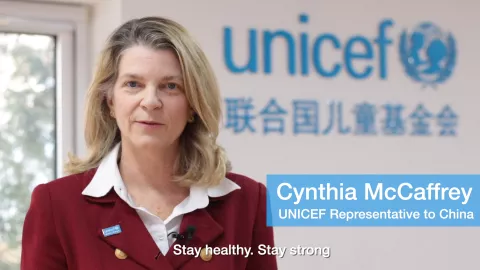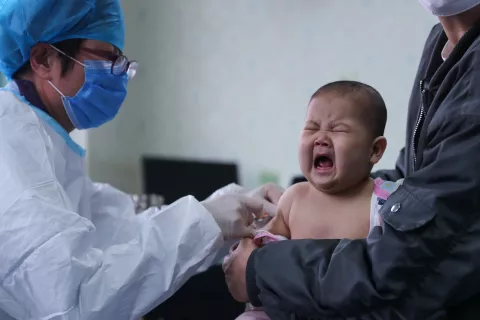Keeping children’s well-being at the forefront as China goes ‘back to school’
Help children get back to school smoothly and safely
- Available in:
- 中文
- English
The response to COVID-19 has required an all-out effort across society. As the world continues its focus on the virus, UNICEF continues its focus on children. There are over 270 million of them in China and over 2.3 billion around the world. So, we – all of us – have a lot of work to do. Many children in China have been learning at home for over six weeks and a lot of them have been restricted to staying inside for longer than that. Children around the world are now joining China’s children as cities close schools and initiate online learning. In the midst of all this, UNICEF wants to remind you and children most of all that this is going to end. Children will go back to school. All of us have a role in making sure their return is safe, smooth and celebratory.
First, everyone – mothers, fathers, aunts, uncles, grandparents, friends – should be prepared and able to talk to the children in your lives. No matter how old they are, they know that there has been a significant disruption in routines. UNICEF, with WHO and IFRC have guidance to help adults speak to children, with age appropriate messages, about the virus. Help each other. As a mother myself, I need help with tough conversations. So, as a parent share these messages and ask those close to you and your children to help get conversations started. When you talk, remember to listen. You can find some techniques for how you can help children handle big, complex emotions here. You will, undoubtedly, learn something about your child’s or her friend’s anxieties. If they are like my daughters they will know more than you think and may offer you some ideas of their own. There is no time like the present – here is a link to the guidance.
Second, we all need to work together to create a safe environment in school buildings. Even as schools gradually open, communities still need to protect themselves from the virus. Administrators, teachers, school nurses, cafeteria staff, janitors – everyone – needs to pay attention to the whole environment. This covers the physical measures for maintaining hygiene, and behavioural regulations that everyone should know and follow like washing hands and limiting physical contact. Teachers will need our support, because they will often be the first to identify and respond to children who are sick in schools. We also know that the connection between health and education workers will need to be strong, as they deal with this situation together.
Third, children everywhere often feel the pressure to do well in their studies, and children in China are no exception. As adults we all need to figure out how we can take the pressure off those children who are worried about how the epidemic might have affected their test scores, while enabling them to move forward with their studies or careers. Flexible policies in schools are encouraged, so that teachers can listen to children and adolescents’ questions and concerns. Children will be receiving huge amounts of information and we will need to make sure they are not overwhelmed. Flexibility in designing the academic calendar after schools reopen is also highly encouraged, particularly in relation to catching up on lessons missed during the remote learning program. Teachers can also be encouraged to maintain some level of flexibility while conducting exams – putting less pressure on children.
Finally, all these efforts can lead to a celebratory return to school. No, I do not mean an all-school gathering. Following your conversations with your children, and the preparation of each school, I can hear children in the hallways greeting their friends and teachers with cheerful bows and elbow bumps, and children coming up with their own non-contact greetings. I hear the lunchrooms ringing with the question – have you washed your hands? Did you use soap and count to 20? Students whose families have experienced the virus directly might face stigma or bullying, and it is up to adults to be vigilant and ensure that the return to school is a positive experience for all children.
The return to school may not be easy for parents or students. But UNICEF encourages all adults to put children’s well-being at the front of your minds as you help them get back to school smoothly and safely.
The article was first pulbished on xinhuanet.com



